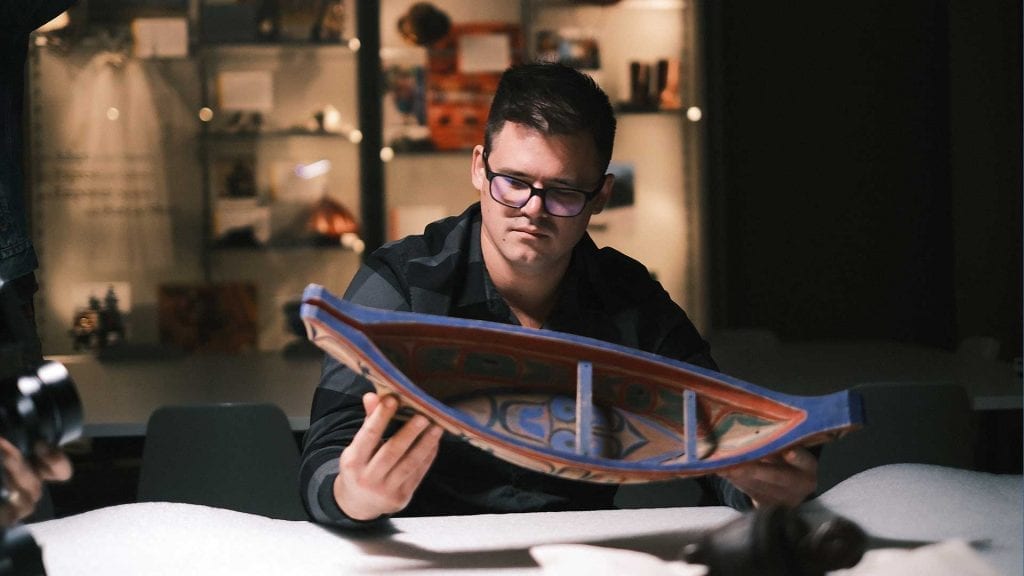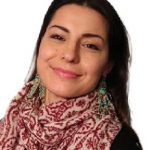
Cole Speck to receive the 2020 Fulmer Award in First Nations Art in the category of the Crabtree McLennan Emerging Artist Award among five other professional carvers honored from across B.C. Photo courtesy: Black Rhino Films
A young Kwakwaka’wakw carver who learned from masters in his community is being honoured as an emerging artist.
Cole Speck has been announced as one of this year’s six recipients of the BC Achievement Foundation’s prestigious Fulmer Award in First Nations Art.
Speck, born in Alert Bay in 1991, has been chosen for the Crabtree McLennan Emerging Artist Award.
Speck now lives in Campbell River, where he spends most of his days carving.
During a phone interview with IndigiNews, the carver is busy at his studio, working on the final stages of a Bookwus mask — a supernatural being known in Kwakwaka’wakw stories to play tricks on people.
“People lost at sea would end up at his village site, and then from there he would try and trick them into eating his food and if they ate his food they would become trapped there,” Speck explains.
As he continues working on the mask, Speck explains that part of the culture of carving is to be familiar with the stories behind the pieces he is creating.
Speck’s first half-dozen pieces that he ever made were utilized ceremonially and burned during a potlatch.
“The cultural aspect … is as important, if not more important, than the physical carving part of it,” the carver says.
As a teenager, Speck began an apprenticeship with renowned Kwakwaka’wakw carver Beau Dick — who passed on an all-encompassing form of learning far beyond the commercial side of art.
Dick, a ‘Namgis hereditary chief known for his supernatural masks, passed away in 2017.
“I was really fortunate I had a really good teacher,” Speck says.
“I would consider him one of the grand masters of history, he’s a really versatile artist who did all kinds of really unique things, and as a result I got to learn quite a bit from him.”
Speck also worked with another renowned Kwakwaka’wakw carver, Rande Cook, on carving a pole for a Northwest Coast exhibition in Holland.
Artistry runs in Speck’s family, he says, as his grandfathers’ oldest brother had what he believes was the first Indigenous art show in Vancouver.
As a result, Speck has been carving since he was a child. He feels that he has been guided into this field of work, and says he would love to mentor someone.
“I go into the local school districts and do storytelling,” he says. “Sometimes I do artwork with the kids and I enjoy doing that.”
Speck is also open to teaching his own children. When his son was a toddler, he would sit and watch him carve for two or three hours at a time.
“It was just adorable, beyond adorable,” Speck says proudly.
The passing down of Kwakwaka’wakw carving traditions is significant — because the culture around it was illegal for many years.
Under Canada’s 66-year Potlatch Ban, holding potlatch ceremonies was considered a criminal offense until 1951. Many Indigenous belongings such as masks were taken from communities and put into museum collections.
As a result, many nations have had to fight to hold on to their culture.
It has taken Speck almost 15 years of learning to get the point of where he is at now. Depending on the size of the piece, or the complexity, it could take a couple months or more for him to complete a piece.
“I don’t really sit down and do one piece in one go,” he says.
“I usually have several projects on the go at one time.”
He prefers to carve large pieces, he says, and his favourite material to carve with is red cedar.
He also likes to try and carve portrait masks, humanoid-type faces that he says are quite tricky to pull off because of the many subtleties.
“I’m still trying to figure them out but I really enjoy making them,” he says.
Speck was also a commercial fisherman for a number of years, but ended up in a car accident in 2018 that caused him to have severe ailing migraines and he wasn’t able to return to the job.
Before his accident, Speck says he used to put in twenty hour days every day towards carvings, because it didn’t feel like a job for him.
Speck says that, now, he’s lucky if he can get a seven or eight-hour day in without side effects from his concussion.
But that hasn’t stopped him from making carving his main source of income.
Next, Speck says, he hopes to learn stone work — he says he would love to go to Italy to study marble sculptures.
He says receiving the Fulmer Award is humbling, because even though he has received a lot of encouragement from his community, he has struggled with the idea of wanting to see better results than what he is achieving.
“I always think I could do better,” he says.
“I’m really grateful to have been selected for it.”
He says he would have loved to be able to get together with the other award recipients.
“The group of people this year is a really great group,” he says. “It’s super cool for me to be associated with them on any level.”
This year, the award certificate will be delivered by mail to each awardee and they will be celebrated through an online campaign taking place in mid-November, according to B.C. Achievement Foundation.
This will include a premiere of a video that is currently being produced to recognize the artists’ achievements.
Speck was one of six artists chosen for an award this year.
Fellow Kwakwaka’wakw artist Lou-Ann Neel is also being honoured, along with Jaalen Edenshaw (Haida), Kelly Robinson (Nuxalk/Nuu-chah-nulth), Nathan Wilson (Haisla) and Evelyn Vanderhoop (Haida).
BC Achievement Foundation Chairwoman Anne Giardini says this year’s recipients will join 80 artists who have received the award over its 14-year history.
“It is a delight for all of us at the BC Achievement Foundation to recognize the six 2020 recipients of the Fulmer Award in First Nations Art,” she says in a statement.
“Their work both respects deep traditions and shimmers with the new.”
Catherine (Katłįà) Lafferty is a Dene First Nation member of the Yellowknives in Somba K’e Northwest Territories now residing on Esquilmalt Territory. She is a reporter for The Discourse as part of the Local Journalism Initiative.
Lafferty’s work is featured on IndigiNews.com, a new platform created by The Discourse and APTN.










